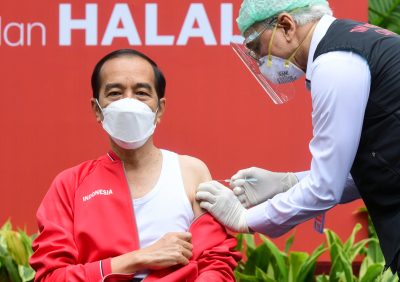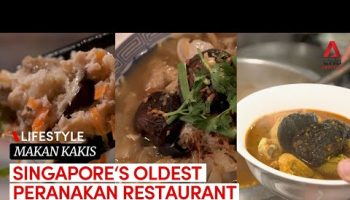Author: Jason Hung, Cambridge University
Jakarta’s mass procurement of Chinese vaccines hints that Beijing and Jakarta may use the public health crisis to strengthen ties. Indonesia’s vaccine rollout will have critical consequences for its intensifying economic and health crisis, and for China’s global reputation.

Indonesia has recorded the highest number of COVID-19 cases in Southeast Asia with over 1.1 million infections and a death toll over 30,000 people.
Indonesia is also the primary importer of Chinese vaccines. It received 1.2 million doses of the Sinovac vaccine on 6 December 2020. In total the country has ordered 50 million doses of Sinovac and 60 million doses of China’s Sinopharm vaccine.
The country spent Rp 637.3 billion (US$45 million) on Chinese vaccines, Rp 277.5 billion (US$19.7 million) on syringes, safety boxes and swab alcohol, and a further Rp 190 billion (US$13.5 million) on vaccine refrigerators and carriers.
The final-stage clinical trial results of Sinovac in Indonesia — expected to be published mid-January 2021 — are yet to be released. China’s reluctance to fully disclose the results casts doubt on the transparency and credibility of the vaccines.
Despite public scepticism about the effectiveness of China’s vaccines, Jakarta and Beijing have already signed an agreement that grants Indonesian state-owned vaccine producer PT Bio Farma the right to produce 50 million doses of Sinovac. Indonesian President Joko Widodo is also the first major world leader to publicly receive a shot of a Chinese COVID-19 vaccine.
If Sinovac does not produce promising results, or serious side-effects or flaws are revealed, Indonesia faces huge financial losses from the number of pre-ordered vaccines. The country will also need to allocate additional financial resources to procure Western COVID-19 vaccines. Bali, Jakarta and other major powerhouse regions of Indonesia have recorded substantial economic contractions due to the pandemic’s impact. Indonesia’s economy will suffer further if Sinovac is not reliable.
In early 2020, Beijing’s ‘mask diplomacy’ saw it sending medical experts and equipment overseas. China also joined COVAX, an initiative run by the World Health Organization aiming for fair global vaccine distribution. These moves reflect Beijing’s attempt to repair its reputation and be seen as a global force in containing the pandemic.
Compared to Chinese vaccines, leading Western vaccines by Pfizer and Moderna are more expensive and need to be stored at low temperatures, increasing distribution costs. China’s Sinovac vaccine can be distributed much more affordably across Indonesia.
This does not necessarily imply that Indonesia is unilaterally dependent on China. It is likely that China has more to lose because the failure of Sinovac in Indonesia would be disastrous for the global promotion of China’s vaccine. A successful Sinovac rollout would open the door to Chinese vaccine markets across Southeast Asia — especially given Indonesia’s influence in the region.
This partnership is mutually beneficial as long as Sinovac shows promising clinical results in Indonesia, allowing China strengthen its global health governance and helping Indonesia combat the health and economic crisis.
If Sinovac is effective, China may be able to shift its role in the COVID-19 narrative, from being the origin of the pandemic to helping the world recover from it. At the very least, a reliable vaccine would help China alleviate its diplomatic pressures and expand its influence overseas.
China’s requests for public applause from among its aid recipients will be nothing new. When China employed its mask diplomacy in early 2020, Beijing required recipient countries to praise China’s public health transparency and humanitarian measures. Beijing continues to use this strategy in its vaccine diplomacy, conditionally sending Chinese vaccines and healthcare products to Indonesia and other developing countries. In the long term, Indonesia will continue to owe China these diplomatic favours. Amid the desperate health and economic crisis, Indonesia’s best option is to pre-order Chinese vaccines in the hope that mass inoculation will save the country.
China’s initial cover-up of the viral outbreak and failed diplomacy have lowered global trust in Beijing. Even if the final trial results are not promising, it is critical for China to publish the data in renowned journals for scientific review and critique of the clinical process. Transparent and honest disclosure of all Sinovac and Sinopharm clinical trial data will also be a helpful reference for other Chinese pharmaceutical firms in the production of their own COVID-19 vaccines.
Another cover up of clinical data will only further damage Beijing’s credibility. China must maintain authenticity and transparency if it is sincerely looking to develop healthier diplomatic, economic and public health relations. Changing the narrative of the pandemic cannot happen overnight. To gradually earn the world’s trust, China must maintain the highest level of integrity.
Jason Hung is a PhD candidate in Sociology at the University of Cambridge.
This article is part of an EAF special feature series on the novel coronavirus crisis and its impact.
The post Indonesia’s Sinovac rollout sets high stakes for China’s vaccine diplomacy first appeared on East Asia Forum.
Source link





